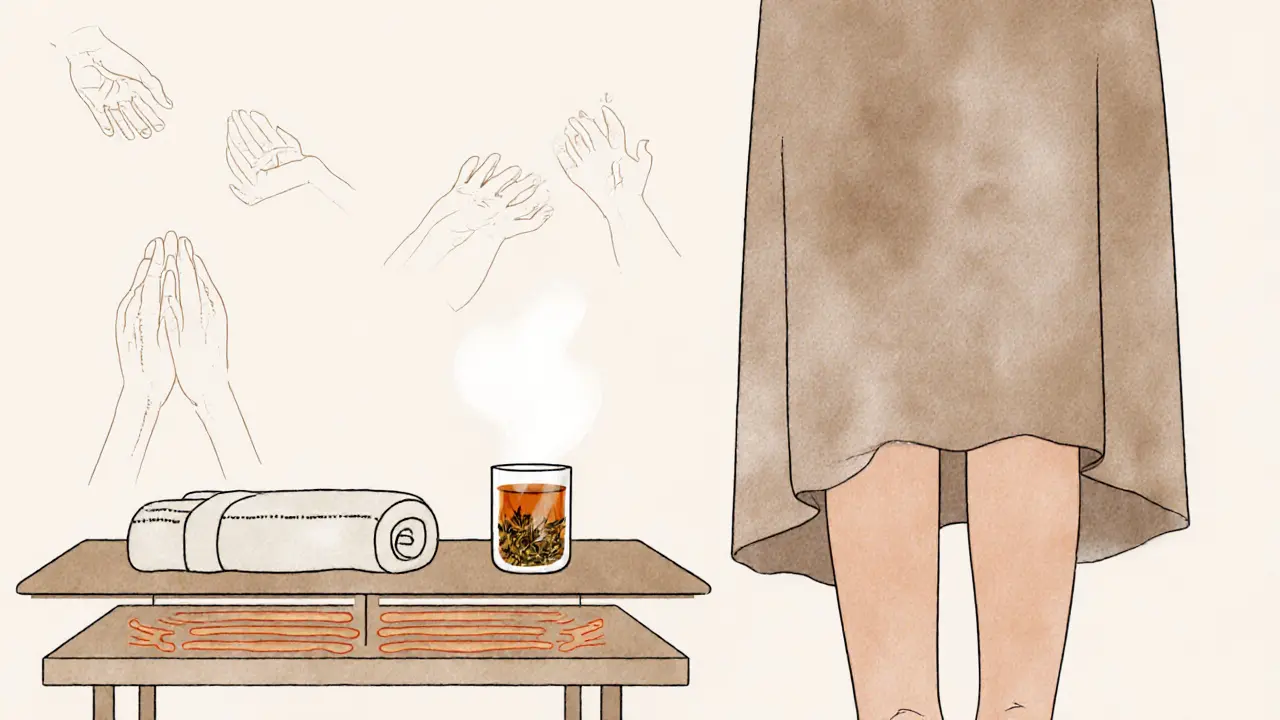
Sex massage in Berlin didn’t start as a taboo service. It didn’t even begin as a commercial offering. It grew out of a city that always blurred the lines between pleasure, health, and freedom. By the late 1800s, Berlin was already a hub of medical innovation and radical social change. Massage was prescribed by doctors for everything from muscle pain to nervous exhaustion. But in certain neighborhoods-like Schöneberg and Kreuzberg-therapists began experimenting with deeper touch, longer sessions, and more intimate settings. What separated Berlin from other European cities wasn’t just the openness to sexuality; it was the way the city treated the body as something to be understood, not hidden.
From Medical Practice to Erotic Experience
In the 1920s, Berlin became the epicenter of sexual liberation in Europe. The Weimar Republic didn’t just allow open discussions about sex-it celebrated them. Magazines like Die Freundin and Der Eigene published articles on bodywork, sensuality, and therapeutic touch. Massage parlors started appearing in basements and quiet side streets, often run by women who had trained in physiotherapy or naturopathy. These weren’t brothels. They were clinics with velvet curtains and incense. Clients came for stress relief, chronic pain, or simply to feel human connection in a rapidly industrializing world.
By the 1930s, the Nazi regime cracked down hard. Massage schools were shut down. Books on erotic touch were burned. The word liebesmassage vanished from public discourse. But underground networks survived. Some therapists disguised their work as physical rehabilitation. Others moved to neutral countries like Switzerland and returned after the war. The knowledge didn’t die-it just went quiet.
Rebirth After the Wall
When the Berlin Wall fell in 1989, the city didn’t just reunite politically-it reopened its body. In the early 1990s, a new generation of therapists, many trained in Sweden, Thailand, and Japan, began offering bodywork that blended Eastern techniques with Western openness. The term sex massage wasn’t used openly yet. Instead, they called it erotic wellness, intimate bodywork, or simply full-body relaxation.
By 1995, Berlin had over 120 licensed wellness centers offering sensual massage. These weren’t strip clubs or escort services. They were quiet rooms with heated tables, essential oils, and trained practitioners who understood anatomy, boundaries, and consent. Many had backgrounds in nursing, psychology, or somatic therapy. One practitioner, Helga Richter, told a 1998 Der Spiegel interview: “We don’t sell sex. We sell presence. And presence is rare.”
The Legal Gray Zone
Berlin’s laws never explicitly banned sex massage. But they never fully legalized it either. The key distinction has always been: no sexual intercourse. Touch can be intimate, prolonged, and deeply sensual-but penetration, ejaculation, or mutual orgasm are illegal under Paragraph 180 of the German Criminal Code. This created a strange, unspoken code. Practitioners learned to read body language, set clear boundaries before the session, and end with a glass of herbal tea and silence.
Police raids in the early 2000s targeted places that crossed the line. But the ones that stayed within the gray zone? They thrived. Clients came from across Europe-Switzerland, the Netherlands, even conservative regions where such services were unthinkable. Berlin became a pilgrimage site for people seeking a safe, respectful, and deeply human form of touch.

Modern Berlin: Wellness, Not Vice
Today, sex massage in Berlin is part of a broader adult wellness movement. It’s not about fantasy or fantasy fulfillment. It’s about reconnection. Many clients are professionals in their 40s and 50s-engineers, teachers, artists-who’ve spent decades suppressing their need for physical intimacy. Others are survivors of trauma, seeking non-sexual touch to rebuild trust in their own bodies.
Modern clinics like BodySoul Berlin and Stillpoint Wellness offer 90-minute sessions that begin with a 20-minute consultation. Practitioners ask about trauma history, comfort levels, and goals. No nudity is required unless the client consents-and even then, draping is always used. Sessions include Swedish strokes, acupressure, breathwork, and sometimes guided meditation. The average price? €120-€180. Payment is cash-only in most places. No online booking. No reviews on Google. Word of mouth is the only advertising.
One client, a 52-year-old architect from Hamburg, said after his third session: “I didn’t come for pleasure. I came because I forgot what it felt like to be touched without expectation. That’s what Berlin gave me back.”
Cultural Differences: Why Berlin Works
Compare Berlin to Paris or London. In Paris, erotic massage is often tied to romance packages and luxury hotels. In London, it’s mostly hidden in private apartments with high risk. In Berlin, it’s treated like a form of mental health care. The city has no stigma around the body. There’s no shame in saying you need touch. No one asks why you’re there. They just hand you a towel and close the door.
This cultural acceptance comes from decades of progressive policy. Berlin has had sex education in schools since the 1970s. Public health campaigns have long promoted body positivity. Even the city’s famous sex museums-like the Museum für Sexualwissenschaft-frame sexuality as science, not spectacle.

What You Won’t Find in Berlin
Don’t expect neon signs or window displays. Don’t expect strippers or lap dances. Don’t expect to walk in off the street and get a session. Legitimate providers don’t advertise. They don’t need to. Their reputation is built on silence, professionalism, and results.
You won’t find massage services in tourist areas like Alexanderplatz or Potsdamer Platz. They’re tucked into quiet courtyards in Neukölln, Charlottenburg, or Prenzlauer Berg. Often, you need a referral. A therapist’s name passed from one client to another. It’s like finding a secret garden-only those who know where to look will find it.
How to Find a Reputable Provider
If you’re serious about finding a legitimate, ethical provider in Berlin, here’s what works:
- Look for places that list qualifications: certified massage therapist, physiotherapist, or somatic practitioner.
- Avoid any place that uses words like “happy ending,” “erotic,” or “sensual” on their website. Legitimate ones use terms like “full-body relaxation” or “intimate wellness.”
- Check if they offer a pre-session consultation. This is non-negotiable in Berlin’s best clinics.
- Pay in cash. No credit cards. No online payments. This filters out scams and illegal operations.
- Trust your gut. If the space feels rushed, overly sexualized, or unclean, leave.
The most respected providers don’t have websites. They have a phone number and a single line: “We work by appointment only. Please call during business hours.”
Why This Matters Beyond Berlin
The evolution of sex massage in Berlin tells us something deeper: that society can normalize intimacy without sexualizing it. That touch doesn’t have to be transactional. That healing can come from stillness, not stimulation. Other cities could learn from this. In a world where loneliness is rising and physical connection is declining, Berlin offers a rare model: one where the body is treated with dignity, not desire.
This isn’t about sex. It’s about humanity. And Berlin, for all its chaos, has held onto that truth longer than most.
Is sex massage legal in Berlin?
Yes, but with strict limits. Touch can be intimate and sensual, but any form of sexual intercourse, mutual orgasm, or explicit sexual acts are illegal under German law. Legitimate providers focus on therapeutic, non-sexual touch within clear boundaries. The line is defined by consent, context, and control-not by what’s done, but by how it’s framed and delivered.
Can tourists access sex massage services in Berlin?
Yes, but not easily. Most reputable providers don’t advertise to tourists. They rely on word-of-mouth referrals from repeat clients. Tourists who find these services usually do so through trusted networks, expat communities, or wellness forums. Walking into a random address you found online is risky. Many scams target tourists. Always verify credentials and insist on a pre-session conversation.
What’s the difference between sex massage and prostitution in Berlin?
Prostitution involves sexual exchange for money. Sex massage, as practiced ethically in Berlin, does not. The goal is relaxation, healing, or emotional release-not sexual activity. Practitioners are trained in anatomy, boundaries, and consent. They use draping, limit contact to non-genital areas unless explicitly agreed upon, and end sessions with quiet reflection. The difference is intention, technique, and professionalism-not the intensity of touch.
Are there any risks in trying sex massage in Berlin?
Yes, if you don’t do your homework. Scammers, fake clinics, and illegal operators exist. Some pose as wellness centers but push for sexual acts. Others take your money and vanish. To avoid this: never book online, never pay with a card, always ask for credentials, and never go alone to an unknown location. Stick to places recommended by trusted sources. If something feels off, walk out. Your safety matters more than curiosity.
Do practitioners in Berlin require certification?
There’s no official government license for sex massage, but reputable practitioners hold certifications in massage therapy, physiotherapy, or somatic psychology. Many have trained in Sweden, Thailand, or Germany’s own bodywork schools. Look for credentials like Heilpraktiker für Körpertherapie or membership in the German Association of Bodyworkers. A professional will show you their diploma or license upon request.
How much does a session cost in Berlin?
Prices range from €120 to €180 for a 90-minute session. Some premium clinics charge up to €250, especially if they include aromatherapy, sound healing, or private suites. Lower prices (under €80) are a red flag-they often mean untrained staff or illegal activity. The best providers invest in training, space, and client safety, and that shows in the price.
Is sex massage in Berlin only for men?
No. About 40% of clients are women, according to a 2023 survey by the Berlin Wellness Association. Many women seek massage to recover from trauma, manage chronic pain, or simply reconnect with their bodies after years of neglect. Female practitioners are common, and many clinics offer same-gender sessions by request. The service is designed for anyone who needs deep, non-sexual human touch.
Can I ask for a specific type of touch or technique?
Absolutely. In fact, it’s expected. Before every session, practitioners conduct a consultation to understand your needs, limits, and goals. You can ask for deeper pressure, slower strokes, or specific areas to focus on. You can also say no to any touch at any time. Consent isn’t a formality-it’s the foundation. Reputable providers will never pressure you.
What makes Berlin’s approach to sex massage unique isn’t the touch-it’s the respect. In a world that often reduces intimacy to performance, Berlin offers something rarer: presence. And that’s worth more than any massage.

Write a comment